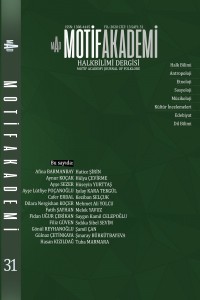TRADITIONAL EXPERIENCE KNOWLEDGE IN LEGENDS IN THE PROCESS OF TRANSITION FROM PERCEPTUAL TO CONCEPTUAL SYMBOLIC STRUCTURE
Abstract
Legends, one of the narratives shaped by the traditional memory of experience of centuries, is one of the oral cultural creations in which the relationship between object-human and space is conveyed through cultural interpretations. In these oral cultural creations, the traditional knowledge, which is formed as a result of interaction with nature and transferred for centuries, describes and maintains the codes of survival in the harsh conditions of the geography and the survival of moral attitudes and behaviors based on social values. In the legends that convey cultural codes based on centuries, perception-based observations and information are the basis of the multi-dimensional conceptual symbolic expression of nature, space, object and human relations. The effort of the individual to make sense of the world he / she lives in is firstly the event, object, situation and so on. It starts with the perception. Each perceived element creates awareness in individual memories, and these elements that create awareness later become a concept by combining with the acceptances and values of social memory. Every information that turns into a concept supports its content with different symbolic elements and these symbolic texts are transferred to future generations through language. The most important tools of this transmission are oral culture products. The information conveyed by oral culture products constitutes the cultural, ecological, linguistic, and ontological codes of the individual leaving traces on the environment in which he lives and being affected from it. It is the experiences of the individual that shape these codes. The knowledge gained by seeing, hearing and living is conveyed as an expression of harmony with the conditions of the geography lived in a narrative fiction that has been esthetized for centuries. The functional analysis of traditional experience memory, which starts with perception and gains a conceptual symbolic meaning, will be the subject of this study in legends, which are symbolic expressions based on ecological benefit, maintaining social values, the association of the individual with nature and society, and a symbolic expression based on similarity.
References
- Alptekin, A. B. (2014). Efsane ve Motifleri Üzerine. Ankara: Akçağ Assmann, J. (2001). Kültürel Bellek. İstanbul: Ayrıntı Bell, S. ( 1999). Landscape: Pattern, Perception and Process. London: E&FN Spon. Divanü Lügat-it-Türk (2006). (Besim Atalay Çev.). Ankara: TDK Ergin, M. (1997). Dede Korkut Kitabı . Ankara: TDK Yayınları.
Abstract
Yüzyılların geleneksel deneyim belleğinin şekillendirdiği anlatılardan biri olan efsaneler, nesne-insan ve mekân ilişkisinin kültürel yorumlarla aktarıldığı sözlü kültür yaratılarından biridir. Bu sözlü kültür yaratılarında doğa ile etkileşim neticesinde oluşan ve yüzyıllar boyunca aktarılan geleneksel bilgi, yaşanılan coğrafyanın zorlu şartlarında hayatta kalabilmenin, ahlaki tutum ve davranışların, toplumsal değerler temeline dayalı olarak yaşatılmasının kodlarını anlatmaktadır. Yüzyıllara dayalı kültürel kodları aktaran efsanelerde doğa, mekân, nesne ve insan ilişkisinin çok boyutlu kavramsal sembolik anlatımının temelinde algıya dayalı gözlem ve bilgiler yer almaktadır. Bireyin yaşadığı dünyayı anlamlandırma çabası ilk olarak çevresindeki olay, nesne, durum vb. algılamasıyla başlamaktadır. Algılanan her bir unsur, bireysel belleklerde farkındalık yaratmakta, farkındalık yaratan bu unsurlar ise daha sonra toplumsal belleğin kabulleri ve değerleri ile de birleşerek kavram haline dönüşmektedir. Kavram haline dönüşen her bilgi, içeriğini farklı sembolik öğelerle desteklemekte ve oluşturulan bu sembolik metinler dil vasıtasıyla gelecek kuşaklara aktarılmaktadır. Bu aktarımın en önemli araçları sözlü kültür ürünleridir. Sözlü kültür ürünleriyle aktarılan bilgi, bireyin yaşadığı çevreye izler bırakmasının ve oradan etkilenmesinin kültürel, ekolojik, dilbilimsel, ontolojik kodlarını oluşturmaktadır. Bu kodları şekillendiren bireyin deneyim temeline dayalı yaşanmışlıklarıdır. Görerek, duyarak, yaşayarak edinilen bilgi, yüzyıllar sonrasına estetize edilmiş bir anlatı kurgusu içerisinde yaşanılan coğrafyanın şartlarına uyumun ifadesi olarak aktarılmaktadır. Ekolojik yarar, toplumsal değerleri devam ettirme, bireyin doğa ve toplumla uyumlu yaşayabilmesinin çağrışım, benzerlik temeline dayalı sembolik ifadesi olan efsanelerde, algı ile başlayıp kavramsal sembolik anlam kazanan geleneksel deneyim belleğinin işlevsel çözümlemesi bu çalışmanın konusunu oluşturacaktır.
References
- Alptekin, A. B. (2014). Efsane ve Motifleri Üzerine. Ankara: Akçağ Assmann, J. (2001). Kültürel Bellek. İstanbul: Ayrıntı Bell, S. ( 1999). Landscape: Pattern, Perception and Process. London: E&FN Spon. Divanü Lügat-it-Türk (2006). (Besim Atalay Çev.). Ankara: TDK Ergin, M. (1997). Dede Korkut Kitabı . Ankara: TDK Yayınları.
Details
| Primary Language | Turkish |
|---|---|
| Subjects | Turkish Folklore |
| Journal Section | Articles |
| Authors | |
| Publication Date | September 15, 2020 |
| Submission Date | August 18, 2020 |
| Published in Issue | Year 2020 Volume: 13 Issue: 31 |



